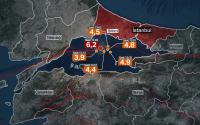17 January 2006Alister Doyle
Landslides kill 800-1,000 people a year and climate change may be adding to the risks from hillside slums in Latin America to Egypt's Valley of the Kings, U.N. experts said on Tuesday.Asia suffered most with 220 landslides in the past century out of about 500 that caused human deaths, they said. Many of the most deadly mudslides were in Latin America and the costliest in Europe.About 800-1,000 people died in landslides in each of the past 20 years, the U.N. University said in a statement.About 100 experts will meet in Tokyo on Jan. 18-20 to discuss ways to prevent and ease damage from landslides amid worries that global warming may make slides more frequent by bringing heavier downpours that loosen soils."If climate change predictions are accurate you will expect...more intense and extreme rainfalls," said Srikantha Herath, senior academic officer of the U.N. University.The report said some cultural sites were at risk from landslides, including the Valley of the Kings where Egypt's Pharaohs are buried, the Inca mountain fortress of Machu Picchu in Peru or China's Huaqing Palace dating from the Tang dynasty."Special attention should be given to cultural and natural heritage sites of universal and irreplaceable values," said Kyoji Sassa, director of the Disaster Prevention Research Institute and a professor at Japan's Kyoto University."In some places, particularly in developing countries, the natural threats are being exacerbated by rapid tourism development," he said.EARLY WARNINGHerath said the Tokyo talks were likely to calls for better monitoring and early warning systems, special protection of cultural sites, better preparedness and quick aid for victims.He said it was impossible to say if global warming was now causing more landslides. Many scientists say that a build-up of heat-trapping gases from burning fossil fuels in power plants, factories and cars will disrupt the climate.Of natural disasters, landslides were the seventh biggest killer behind droughts, storms, floods, earthquakes, volcanoes and extreme temperatures, according to the report for the U.N. University, Kyoto University and UNESCO.Among severe landslides, about 2,800 died in Cholima in Honduras in 1973 and almost 1,200 in northern Italy in 1963. The Louvain University database on which the figures are based often excludes landslides triggered by earthquakes.In many poor nations, many people were forced to live on unstable hillsides -- away from flat plains exploited for farming."Late arrivals are always settling in the most dangerous land," said Janos Bogardi, director of the U.N. University Institute for Environment and Human Security.He said that better building codes and simply giving out information about the risks of mudslides could save lives.






